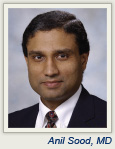 Formal discussant, Anil Sood, MD, The University of Texas MD Anderson Cancer Center, Houston, said that both studies presented important information, but several issues should be considered, including the best combination with bevacizumab, whether the benefits accrue from bevacizumab alone or chemotherapy plus bevacizumab, the optimal dose of bevacizumab, how long to continue treatment, and the true role of bevacizumab in platinum-sensitive disease.
Formal discussant, Anil Sood, MD, The University of Texas MD Anderson Cancer Center, Houston, said that both studies presented important information, but several issues should be considered, including the best combination with bevacizumab, whether the benefits accrue from bevacizumab alone or chemotherapy plus bevacizumab, the optimal dose of bevacizumab, how long to continue treatment, and the true role of bevacizumab in platinum-sensitive disease.
“The gains in progression-free survival [with bevacizumab] are relatively modest. This raises questions about the best chemotherapy partners and the bevacizumab dose. When you stop giving bevacizumab, there is a falling off of benefit. We don’t know how long to continue treatment. Also cost is a factor…. Bevacizumab costs about $100,000 per year,” Dr. Sood said.
“We are not necessarily curing patients [with bevacizumab]. They may develop adaptive-evasive responses. Much more work needs to be done to identify and develop more effective therapies,” he commented. ■
Disclosure: Dr. Sood reported no potential conflicts of interest.

